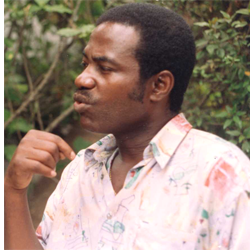|
 Kosmos (Moutouari, Côme), Congolese singer; born Kivimba, Congo-Brazzaville, July 25, 1944. Kosmos (Moutouari, Côme), Congolese singer; born Kivimba, Congo-Brazzaville, July 25, 1944.
Kosmos was born to a musical family that included two other prominent singers, his brothers Pierre and Michel Moutouari. Kosmos made his professional debut in 1965 in one of the great Comgolese rumba bands, Bantous de la Capitale of Brazzaville. He joined a vocal corps that included Edouard "Edo" Ganga and Célestin Kouka, both veterans of O.K. Jazz, and rising new star Pablito M'Bemba (later known as Pamelo Mounk'a). Kosmos sang with a warm, smooth tenor and wrote several of the band's best songs. His first hit, "Ebandeli ya Mosala" (the start of work), detailed the difficulties of beginning a new job.
"Makambo Mibale" (two things) commented on the "troubles" women and money brought to men's lives. "Miléna" told the sordid tale of a woman whose parents sold her soon-to-be-born child to a wealthy suitor who was not the real father.
The years 1965 to 1972, the band's most productive and popular period, ended when Kosmos, Pablito, and Célestin left to form the Trio CEPAKOS. Together with their backing band, Le Peuple (the people), the trio eventually rivaled their former employer in popularity. Among Kosmos's songs with the group "Accident ya Peuple" recounted a traffic accident that destroyed much of the band's equipment, while "Mylla" and "Kamwiya" spoke of wandering girl friends and implored them to come back to him.
Pablito's return to Les Bantous in 1978 spelled the end for the Trio CEPAKOS, still Kosmos kept Le Peuple alive for another two years. In 1980 he flew to Paris to audition for the production and distribution company Safari Ambiance. That encounter led to three solo albums over the next five years, including the acclaimed Kamani Mado. Kosmos also made occasional reunion appearances with Les Bantous while maintaining his solo career.
The general economic and political malaise in Congo-Brazzaville in the nineties brought Kosmos's career to a near standstill. He was working on new projects with Brazzaville producer Freddy Kebano, but they appear not to have reached fruition. Civil war in 1997 ended, for the moment, any chance for a musical renaissance in Brazzaville.
For nearly twenty years, Kosmos was one of the Congolese rumba's leading singers. His mellow voice, striking compositions, and youthful good looks brought him enormous popularity. His solo outings in Paris maintained his string of successes. Had he chosen to reside in the French capital he may well have extended his career. His preference for Brazzaville has proven to be a nearly insurmountable obstacle.
© 2011 Gary Stewart
SELECT DISCOGRAPHY
Kamani Mado (Dragon Phenix LP DPX827) 1980; Ba Camarades (Safari Sound LP SAS040) 1982; Naleli Congo (Safari Sound LP SAS044) 1984.
With Bantous de la Capitale: Le Triomphe des Artistes Congolais (vol. 1, Glenn GM324007) sixties and seventies recordings reissued 1995; Rosalie Diop (Sonodisc CD36569) sixties and seventies recordings reissued 1997; Makambo Mibale (Sonodisc CD36592) sixties and seventies recordings reissued 1998.
With Trio CEPAKOS/Le Peuple: Le Triomphe des Artistes Congolais (vol. 2, Glenn GM324008) seventies recordings reissued 1995.
SELECT BIBLIOGRAPHY
S. Bemba, 50 ans de musique du Congo-Zaire (Paris, 1984); G. Stewart, Rumba on the River (London and New York, 2000).
|

